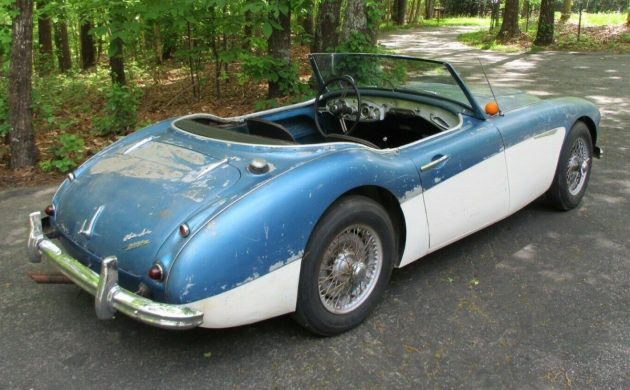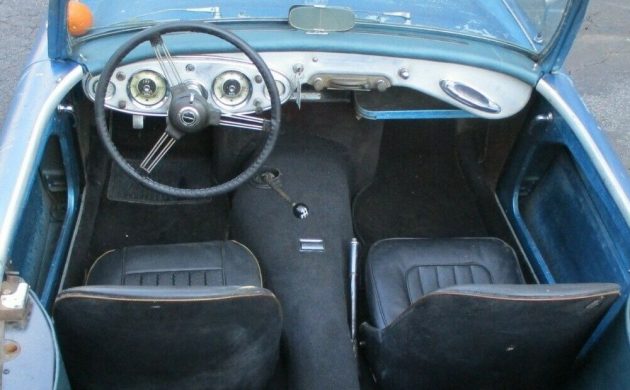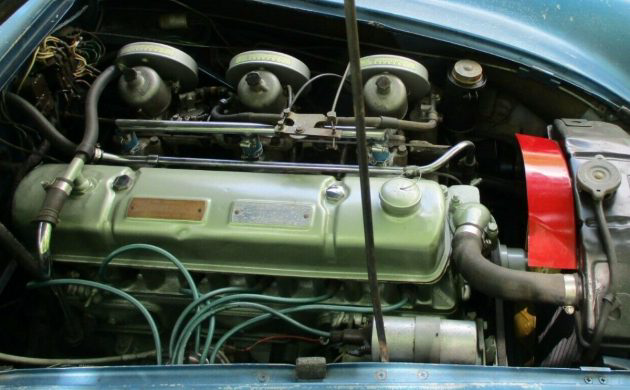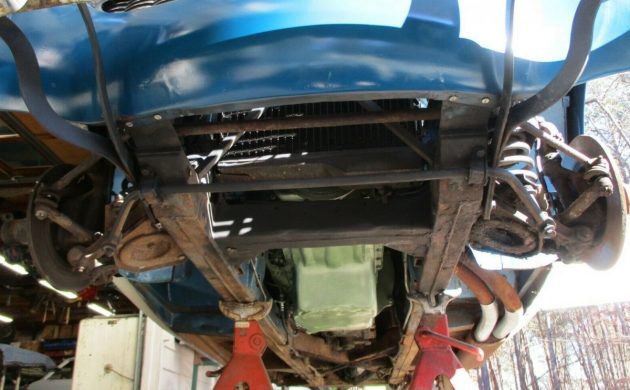Mark II Powered: 1960 Austin-Healey 3000 MK I
British auto manufacturer Austin-Healey was formed in 1952 when Herbert Austin of Austin Motor Company and Donald Healey of Healey Motor Company entered into a joint venture to produce sports cars, a partnership that lasted until 1972 when their 20-year agreement came to an end. Healey had a background as a rally driver, and the company produced a series of two-seaters, including the 3000 which was built between 1959 and 1967. The first 3000 models were known as Mark I cars, followed by the Mark II which featured a more high-performance engine. If you like the idea of an early Mark I car equipped with a later Mark II engine, you’re in luck, as the 1960 Austin-Healey 3000 being offered for sale here on eBay fits the bill. The car is located in Canton, Georgia, and so far nobody has placed the $25,000 opening bid.
The seller says this is one of the lowest mileage, straightest, and most rust-free Austin-Healey vehicles he has ever owned. The current owner purchased the car from an Arizona seller in 1993, and it recently came out of a long-time inside hibernation for recommissioning and work to make it road-worthy. The body panels are said to be all original, with excellent alignment and gaps. The original color was Healey Blue, although it has been repainted in a slightly different shade of blue with white down below.
The interior is said to be original and in need of some upholstery, carpet, and door panel work, though the seller says it’s serviceable as-is. All of the gauges are working except for the tach and speedometer, plus the car has the original factory wiring throughout. The windshield is like new, with the original side curtains said to be in good serviceable condition, with a crack in one of the Plexi panels. Inside the trunk area is claimed to be good, original, and solid, with no rust.
The original motor and transmission were replaced in the early ’80s with a 1962 BN7 triple-carb engine, which was overhauled before installation and has seen very few miles since. New fan belts are in place plus all 3 carburetors have been rebuilt. The transmission was also rebuilt at the same time as the engine and is said to work perfectly, as is the overdrive. The brakes are all new and fully functional, and the car still has the original wire wheels but all of the tires need to be replaced.
The undercarriage is said to be excellent and original with no rust, just some surface dusting. While the car could benefit from some TLC, the seller thinks there’s good profit potential for the do-it-yourselfer if that’s what the next owner has in mind. What are your thoughts on this 1960 Austin-Healey 3000 Mark I?
Auctions Ending Soon
 2002 Subaru Impreza WRXBid Now23 hours$333
2002 Subaru Impreza WRXBid Now23 hours$333
 1975 Chevrolet Corvette ConvertibleBid Now24 hours$4,000
1975 Chevrolet Corvette ConvertibleBid Now24 hours$4,000
 1964 Ford F-100 Camper CustomBid Now1 days$2,000
1964 Ford F-100 Camper CustomBid Now1 days$2,000
 2006 Jeep Wrangler SportBid Now2 days$11,000
2006 Jeep Wrangler SportBid Now2 days$11,000
 1974 Datsun 260ZBid Now4 days$750
1974 Datsun 260ZBid Now4 days$750






Comments
Wonderful car, have no idea if drivetrain swap will hurt value, but will increase smile power. Maybe they don’t get the love as the E types Jags do but go down the road really nice and sound amazing.
I wouldn’t think the engine swap was done for more power: the net gain, assuming no modifications to the three-carb unit, would have been a paltry eight horsepower. I suspect there was damage to the original engine, and the exchange was the cheapest solution.
The only way a subsequent buyer could prove this was not the original engine (aside from counting carburetors, that is) would be via a Heritage Certificate. If memory is accurate, the car’s builder’s plate lists the chassis number but says to “see engine” to get the number of same. I wouldn’t complain, assuming the rebuild was properly done.
The factory Healey Blue/blue interior combination is a personal favorite. I’d go back to that. Otherwise, just sort out whatever mechanical issue might be lurking and drive.
And drive, and drive. $25K sounds fair enough. But you must remember that, for me, almost ANY price for a complete, running Big Healey that hasn’t started to rot away is a fair price!
Agree RayT but the car is a little rough around the edges for 25K. Paint, instrument repair, surface rust on everything underneath isn’t going to be cheap to bring up to proper condition. Biggest unknown is the condition of the frame where the body sits flat on it. Had trouble with that on both our 100s. Nice car to start with though and like you I love the blue. My favorite year and body style.
@ray T. If I remember correctly BMC engines had a steel or aluminium plate riveted to the engine block and was easily removed, so it would have been easy to fit to the replacement engine and nobody would know the difference.
I agree with Bob on the value. It’s a great car that has good bones as they say. I love these cars and would give it serious consideration if I were in the market for a classic British roadster. However Hagerty #4 condition which I think this car meets is worth 20K so I would be hesitant to match the opening bid. Personally I wouldn’t care about the originality with the later engine. I would enjoy it for a season before I started any cosmetic work and by cosmetic I would refresh the interior and do a driver quality paint job. Put too much into it and the. You would be afraid to drive it.
I agree with the assessment. This would be a terrific car to rack and restore. I have found that if you can find any English engine running, don’t touch it. I owned Jag’s and hated their drive train. Absolutely fell in love with the 3000. Seemed more of a man’s car to me. BUT, I would be interested if it was about $7 cheaper.
Hmmmm.. I think the author maybe needs to check his research notes? Herbert Austin founded the original Austin Car company and ran it in the pre-WWII years – he had been dead for several years by the time Donald Healey partnered with BMC to produce the Austin-Healeys.
Leonard Lord was the guy in charge at BMC when Austin-Healey came into being in 1952.
You are certainly correct about the late Mr. Austin, and I’m wondering, was there ever a corporate entity named Austin Healey that built these cars or was that name just a model built by BMC? The original Austin powered four cylinder car was to be called the Healey 100, no mention of Austin at all.
The 100.4 was called Austin Healey. My owners manual was titled Austin Healey.
Chinga Trailer: at the Earls Court Motor Show of 1952, Donald Healey first displayed his New Healey 100 sports car. On that first day it was a Healey and not an Austin-Healey. At the motor show, Lord Leonard Lord of Austin noticed that DonaldHealey’s sports car used a modified Austin 2.6 four cylinder engine and an Austin gearbox. He walked over to Donald and spent hours chatting with him about a proposed partnership. Austin did not have a sports car and at the time sports cars were taking North America and Europe by storm. Donald Healey could only build by hand around five to seven cars a week, which meant that he would never make much money…so why not let Austin build the cars on BMC’s assembly lines? Donald Healey could keep total creative control over the car as it would evolve. Overnight a new “Austin-Healey” badge appeared on the elegant sports car. Its fantastic looks and relatively inexpensive drive train, combined with not having a direct competitor, as it occupied aunique niche right between MG/Triumph and Jaguar, made it a resounding success…and is still appreciated nowadays for its looks and ruggedness (if not abused). Thus to be very specific about what you were wondering about,Chinga, “Austin-Healey” was a hyphenated marque. In other words, two separate companies coming together to jointly produce a vehicle.
The only 3 carb Healey engine I’ve ever seen in person was in a 100-6, about a 1959 model. That Healey was something special. It was a 2 seater, when most 100-6 had the rear jump seats, and also the 3 carbs when most had the 2. So, if I’m not mistaken this engine is actually older than the car
The only mass produced 3 carb Healeys were the 1962 models.
I don’t doubt you’re right. I just remember the fellow with the car telling me it was a 100-6. My 100.4 had broken down on the side of the road and he towed me to his house nearby to help me get it running again. He had the 3 carb 2 seater and offered to trade that car for mine.
@Ray T. If I remember correctly BMC engines had a steel or aluminium plate riveted to the engine block and was easily removed, so it would have been easy to fit to the replacement engine and nobody would know the difference.
Bargain price considering the prices they are making around the world